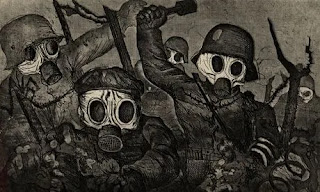SOME NOTABLE SENTENCES IN "IN STAHLGEWITTERN" OF ERNST JÜNGER
I am currently reading the renowned war memoir of Ernst Jünger, a soldier who volunteered to the German army during World War I at the age of 19, to let myself being exposed to complex German sentences. I read the German original side-by-side with the English translation of Basil Creighton (Zimmermann&Zimmermann, 1985). It has been a very rewarding experience. This is just a note on many sentences that strike me as aesthetically pleasing and grammatically complex. I have also included the translation of Basil Creighton (1929) and of Micheal Hofmann (2003).
For the German text, I consulted the printed 6th (1925) and 9th edition (1929). Both editions are identical in content and are reprints of the 5th edition (1924), which contains many important additions as compared to the 2nd (1922) and 3rd editions (1922). Between 1924 and 1934, there were no changes in the text. Otherwise, the critical edition of "In Stahlgewittern" entitled "In Stahlgewittern Band 2: Historisch-kritische Ausgabe - Variantenverzeichnis und Materialen" would include them in their collation.
For citation, I wrote (G.page number) for the German text, and (E1.page number) for Creighton's text. For Hofmann's text, I use electronic version so I don't cite his page number.
1 - Es [It] ist im [in] Krieg [war] immer [always] mein [my] Ideal [ideal] gewesen [has been], den Gegner [the enemy] unter Ausschaltung [eliminating] jedes [each] haßgefühls [feelings of hatred] nur [only] im [in] Kampfe [battle-struggle] als [as] solchen [such] zu betrachten [to regard], und [and] ihn [him] als [as] Mann [man] seinem [his] (+dative) Muter [courage] entsprechend [according to] zu [to] werten [evaluate]. (G.46) (E1.52)
Es ist im Krieg immer mein
Ideal gewesen, den Gegner unter Ausschaltung jedes haßgefühls nur im Kampfe als solchen zu betrachten,
und ihn als Mann
seinem Muter entsprechend zu werten.
Subject Verb Adverbial Adverb Preposition Object
Word-by-word translation:
It has in war always my ideal been, the enemy
(while) eliminating each feeling of hatred only in battle as such to regard,
and him as man his courage according to to evaluate.
My translation in English:
It has always been my ideal in war, to regard
the enemy as such only in battle while eliminating each feeling of hatred, and
to evaluate him as man according to his courage.
Basil Creighton's translation:
It has always been my ideal in war to eliminate
all feelings of hatred and to treat my enemy as an enemy only in battle and to
honour him as man according to his courage (Basil Creighton).
My translation in French:
C’est toujours mon idéal
dans la guerre qu’il faut consider les ennemis comme il l’est sur le champ et
eliminer tant des haines, et les evaluer comme des hommes en fonctionne de leur
courage. (A bit awkward).
Commentary: This sentence strikes me as complex and counterintuitive,
due mainly to its word order (Wortstellung). The idiomatic use of "unter"
also adds another layer of complexity. I have asked a question about the phrase
"unter Ausschaltung jedes haßgefühls".
Here "unter" points at
1) kennzeichnet einen Begleitumstand
(indicates an accompanying circumstance)
2) "kennzeichnet die Art und Weise, in
der etwas geschieht; mit (indicates the manner in which something occurs,
similar to with).
I think the second usage is applied here.
"Unter" could be used in a highly idiomatic manner and when
translating it one has to keep in mind that its meaning is highly
context-dependent. There is indeed no straightforward translation.
2 - Ich [I] habe [have] gerade [exactly/precisely]
in [on] diesem [this] Punkte [point] unter [among] den [the] englischen [English] Offizieren [officers]
viele [many] verwandte [kindred] Naturen [souls] kennengelernt [come
to know/get to know]. Es [It] gehört dazu [is required/is necessary] allerdings [however], dass [that] man [one] sich [oneself] nicht [not] durch [by] übertriebenes [exaggerated] Nationalgefuhl [national
feeling] blenden [blinded] lasst [let], wie [as] es [it] bei [with] einem [a] grossen [large] Teil [portion/proportion/number] der [of] Franzosen [French] und Deutschen [German]
der [the] Fall [case] ist [is].
My translation in English:
It is precisely on this point that I come to know many kindred
souls among English officers. It requires/it is necessary, however, that one
does not let oneself be blinded exaggerated national feeling, as is the case
with a large number of French and German.
Basil Creighton's translation:
It is exactly in this that I have found many kindred souls among
British officers. It depends, of course, on not letting oneself be blinded by
an excessive national feeling, as the case generally is between the French and
the Germans.
Commentary: The term “gehört dazu” is
interesting here. The online Collins dictionary gives several instances where
it could be translated as “it takes…”, for example:
dazu gehört Mut - that takes
courage
dazu gehört nicht viel - it doesn’t take
much
zu dieser Arbeit gehört viel Konzentration - this work calls for or takes a lot of concentration
The construction is zu…gehören
There is also a similar construction, as zu… gehören auch, for
example:
Zum Risikomanagement gehören auch die regelmäßige Überprüfung der
Effizienz der verwendeten Sicherungsinstrumente und die… (Risk management also
includes regular reviews of the efficiency of the hedging instruments used and
the…) (Linguee.com)
3 - Das Gesicht [The face] der [of] Landschaft [landscape/scenery] war [was] finster [dark/gloomy] und fabelhaft [fabulous], der Kampf [the battle] hatte [has] das Liebliche [pleasant features, loveliness,
charm] der Gegend [area]
hinweggewischt [washed away/wiped away/erased/removed
from] und seine ehernen [iron]
Züge [lines] hineingegraben
[dugged into/ carved
into/engraved], vor denen der einsame [lonely] Zuschauer [spectators] erschrak [freightened/terrified].
My translation in English:
The face of the landscape was gloomy
and fabulous, the battle had wiped away the loveliness of the area and dug into/carved
into it its own iron lines, which frightened/terrified the lonely spectator.
Basil Creighton's translation:
The face of earth was dark and fabulous, for the war had expunged the pleasant features of the countryside and engraved there its own iron lines that in a lonely hour made the spectator shudder.
Micheal Hofmann's translation:
The aspect of the landscape was dark and fantastic, the war
had erased anything attractive or appealing from the scene, and etched its
own brazen features, to appall the lonely onlooker.
Commentary: There are many things that are noticeable about this sentence. First are separable verbs (Trennbare Verben). "Hinweggewischt" is actually (Hin)weg+wischen and "Hineingegraben" is Hinein+graben.
The second things that is quite unique is the use of "das Liebliche". "Liebliche" belongs to adjective and adverb. Here Jünger used it as a noun. Creighton shew that he was a very competent translator when he rendered it as "pleasant features".
Hofmann's rendition is quite less elegant and more cumbersome than
Creighton's. Creighton translated "der Kampf hatte das Liebliche der
Gegend hinweggewischt" as "the war had erased anything attractive or appealing from the scene", the italic part is much less
succinct and beautiful than Creighton's "expunged the pleasant features of the countryside".
"Expunge" is a great verb to use here.
4 – Die Verlassenheit [the desolation/solitariness/loneliness] und das tiefe [deep] Schweigen [silence], ab und zu [now and then] vom (von+dem) dumpfen [muffled] Ton [ton] der Geschüße [gunfires] unterbrochen [interrupted], wurden [were] durch [by] den traurigen [sad] Eindruck [impression] der Zerstörung [destruction/devastation] verstärkt [reinforced].
My translation in English:
The desolation and the deep silence, now and then, interrupted by
muffled ton of gun sounds, were reinforced by sad impression of devastation.
Basil Creighton's translation:
The forlornness and the profound silence, broken now and then by the deep tones of the guns, were emphasized by the sad marks of devastation.
Micheal Hofmann's translation:
The desolation and the profound silence, sporadically broken by
the crump of shells, were heightened by the sorry impression of
devastation.
Commentary: Creighton displayed his talent here as a
translator. Instead of rendering "Verlassenheit" as
"desolation", he used a rarer term "forlornness", which
conveyed a more poetic tone. He skillfully translated "tiefe" as "profound",
leaving "dumpf" as "deep", so there is no repetition. He
also rendered "unterbrochen" as "broken", which retains
certain similarity to the original German. Finally, he chose "marks"
instead of "impression". This is, in my opinion, a brilliant choice.
Hofmann seems to have consulted Creighton's
translation, but his wordings are nowhere as elegant as Creighton. He rendered
"Geschüße" as "crump of shells", which took away the
original "dumpfen Ton der Geschüße" (deep tones of the guns).
5 - [...] in dem [in
which] vielleicht [perhaps]
die Gerippe [the bones]
der unglücklichen [unfortunate] Hansbewohner [Hanseatic residents] von [by] den [the] überaus [extremely] geschäftigen [busy] Rattenschwärmen [swarms of rats] benagt [gnawed] werden [was][...]
My translation in
English:
In which perhaps the
bones of an unfortunate Hanseatic occupants were gnawed by the extremely busy swarms
of rats.
Basil Creighton's
translation:
In which, perhaps, the
bones of the unfortunate tenant have been gnawed clean by the never idle swarms
of rats. (E1,36)
Micheal Hofmann's
translation:
where the bodies of the
unlucky inhabitants of the houses were gnawed by the particularly assiduous
swarms of rats[…]
Commentary: This fragment of a sentence is actually a
dependent clause. In dependent clause, according to German grammar, the verb
must be placed at the end of the sentence. In this case the verb
"benagen" is in passive form "benagt werden".
Creighton added a very expressive word
"clean" in "gnawed clean", amplifying the degree of horror
in time of war.
6 - Traurige [Sad] Gedanken [thoughts] beschleichen [creeps up on] den [in the] Krieger [warrior], dessen [whose] Fuß [feet] auf [on] den Trümmern [the ruins] einer [of] solchen [such] Stätte [place] ruht [rest], wenn [when] er [he] derer [of those] gedenkt [remember/think of], die [who] noch vor kurzem [recently] hier [here] friedlich [peacefully] lebten [lived].
My translation in English:
Sad thoughts creeps up on the warrior (soldier), whose feet rest on the ruins of such a place when he thinks of those who recently used to live peacefully here (who recently led a quiet life here).
Basil Creighton's
translation:
The soldier who walks
among the ruins of a place like this and thinks of those who lately lived their
peaceful lives there, may well be overtaken by sad reflections. (E1,37)
Micheal Hofmann's
translation:
Sad thoughts are apt
to sneak up on the warrior in such a locale, when he thinks of those who
only recently led their lives in tranquillity.
Commentary: Creighton's version shows certain kinds of
creativity here. He basically rewrote the sentence in a way that conveys a
clearer visual image than Junger. His description conjures an image of a
soldier who wanders through the war-torn village and was slowly seized by
sadness as he thought of a happy life that was once there. This is shown by
translating "dessen Fuß auf den Trümmern" into "walks among the ruins", effectively replacing a static image with an action in progress. That sense of movement is what is creative here.
Nevertheless, Creighton
did not manage to convey the gentle increase of sadness, and used the verb
"be overtaken" as if it was meant to be "overwhelmed by".
Hofmann's translation does manage to preserve this sense of gradual rise of
sadness in the heart of the soldier.
The problem with
Hofmann's translation is that he did not even render "dessen Fuß auf den
Trümmern" (whose feet rested on the ruins) into English. This is a serious
omission as it fails to convey that sense of wandering and loneliness.


Comments
Post a Comment